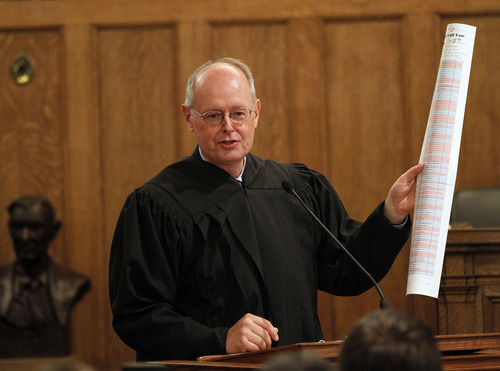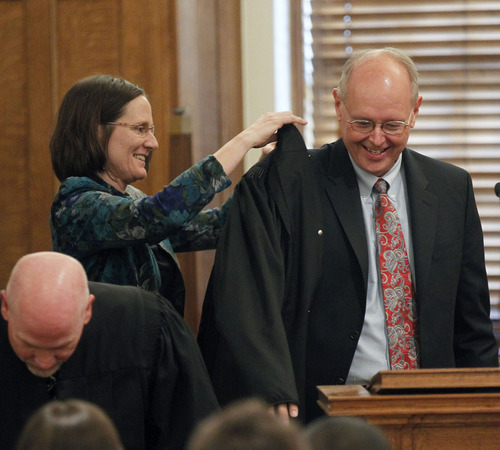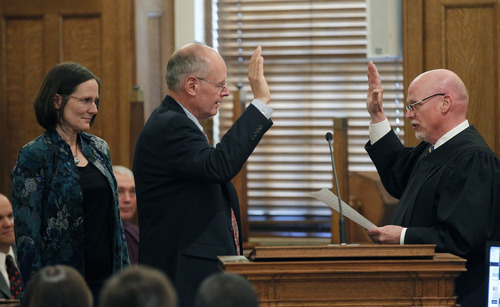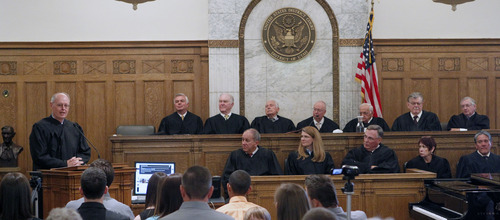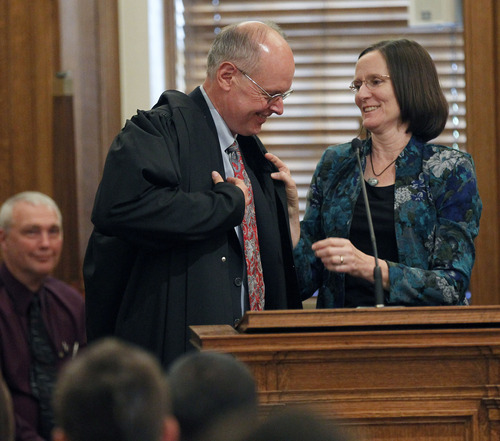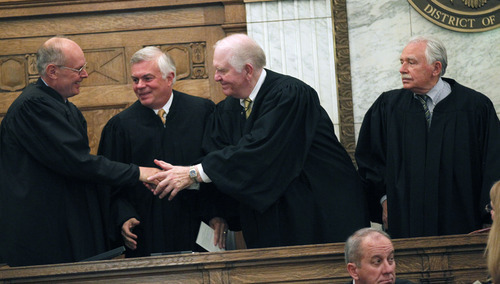This is an archived article that was published on sltrib.com in 2012, and information in the article may be outdated. It is provided only for personal research purposes and may not be reprinted.
Utah's newest federal judge achieved several firsts on Tuesday as he officially took the bench — somehow managing to get a Steinway piano into a courtroom of the venerable old court building and setting up a webcast of the swearing-in ceremony.
"I had so much time to think about this, that I kept adding things. The piano was the first one, the webcam was the next. If it had been another six months, who knows what might have happened today," said U.S. District Court Judge David Nuffer, drawing laughs from the packed audience on hand to witness the seating of Utah's 16th federal judge.
President Barack Obama nominated Nuffer to the vacancy, left when Judge Dale A. Kimball took senior status nearly a year ago. The U.S. Senate confirmed Nuffer on March 22 and a day later, Obama made the appointment official.
After more than two decades in private practice in St. George, the Brigham Young University law school graduate was named a part-time magistrate judge in 1995 and, as of 2009, served at the state's chief magistrate. Nuffer is recognized nationally as an expert and pioneer in court use of technology.
In his remarks, Nuffer spoke of his visits as a legal expert to foreign countries where it is unlawful to criticize leaders, where journalists and forums for free expression are attacked, where women are subject to abuse and rape without remedy and where 15-year-old boys use automatic weapons as a form of "religious compliance control." He pledged to serve as a trustee of the freedoms that are expressed in and protected by the American judicial system.
"We who work in this court in whatever capacity ...have by virtue of our privilege to be here a duty to preserve and enhance these freedoms," he said, adding that the largest task is equally resolving disputes, standing as the third, independent branch of government, and guaranteeing the Constitution has effect.
The judge's wife Lori performed Sonata, Op. 16 during the ceremony, a piece by composer Mykola Lysenko of the Ukraine, one of the countries where Nuffer has offered his expertise to help improve the legal system.
Utah Senators Mike Lee and Orrin Hatch, both members of the Senate Judiciary Committee, attended the ceremony, praising Nuffer's capabilities as a jurist. Other federal judges, members of the Utah Supreme Court, Congressman Jim Matheson and Nuffer's former associates also attended.
Lee said that upon arriving in Washington, D.C., his first bit of business was to meet with the White House Counsel's Office and explain "why the president could not find a better person to occupy this seat than Judge David Nuffer, who understands and respects, and has in the past the understood and respected ... the necessary limited role of the federal judiciary."
Hatch also touched on Nuffer's ability to interpret, rather than make, law and, with other federal judges, do more than other branches of government to "save" the country's Constitution.
"It's a good day when you find the right person for the right job, and that is what we celebrate today," Hatch said. He also praised Nuffer's technological expertise and understanding of the "promise" it holds for the legal system.
"Judge Nuffer will help to make the law and the court system more accessible to all of our citizens," Hatch said.
Steven E. Snow, a general authority in The Church of Jesus Christ of Latter-day Saints and Nuffer's former law partner, said when they first met 35 years ago, the judge had hair, a beard and a purple AMC Pacer. They opened a law firm in St. George and spent 22 years working together before veering off in different directions, Snow said.
"He is kind, considerate and, as I so often observed through the years, he is patient," Snow said. "These qualities make him particularly well qualified to preside in a federal courtroom."


